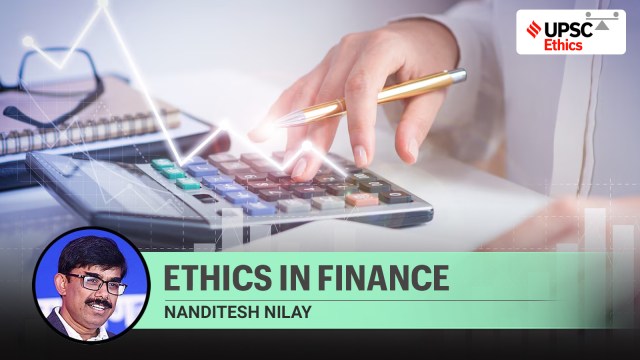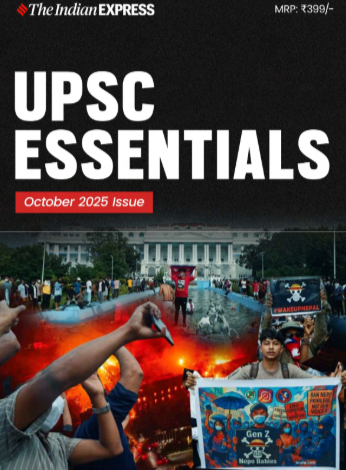UPSC Ethics Simplified | Integrity in Finance: Money talks—But what does it say about ethics?
Money without ethics is just an empty number. From White House donations to India’s crony capitalism, financial greed is eroding governance. Can we revive Dharma and integrity in finance? 'The answer lies in balancing wealth with ethics—before it's too late,' says our ethics expert.
 Are we witnessing the erosion of financial integrity and the spirit of ethics itself?
Are we witnessing the erosion of financial integrity and the spirit of ethics itself?Relevance: The budget week has just passed, and while the entire country focused on wealth and taxes, isn’t it equally important to discuss financial ethics and its many dimensions? UPSC Ethics Simplified draws your attention to topics related to applied ethics. UPSC recently has been focussing on contemporary issues and raising some ethical questions for the candidates. In the past, we have viewed Pollution, War and Sports from the prism of ethics. Today, Nanditesh Nilay, who writes fortnightly for UPSC Essentials, takes us through an important theme of ‘Money and Ethics’.
Let’s revisit the year 2024 and the incident related to the White House, where a Senate campaign accepted around thirty-two thousand dollars from over ten healthcare and chemical industries. There was nothing new in it—data shows that the White House has been receiving huge sums of money from dozens of companies since at least 2019. However, the world was stunned when Health and Human Services Secretary nominee RFK Jr. directly confronted Bernie Sanders, saying, “Bernie, you have accepted millions of dollars from the pharmaceutical industry. In 2020, you were the single largest receiver of pharmaceutical dollars—$1.5 million.”
Even in a democracy like America, financial temptation remains a powerful force. The 2008 economic crisis is a testament to this reality. Closer home, in our own country, even the brightest minds often compromise for money. How can we forget the case of CGST bureaucrats caught in bribery or the constable involved in a multi-crore scam?
Vishal Gupta, in his paper Indian Administrative Service (IAS) and Crony Capitalism: A Review, argues: “One of the ways corruption occurs in public service delivery is through bribes paid to access or expedite services. Another, less overt but equally damaging, form of corruption is when public resource allocation is distorted by money, power, access, or connections—also known as crony capitalism. The Indian Administrative Service (IAS) is considered a significant contributor to crony capitalism in India.”
So, where should we begin with finance and ethics?
Financial ethics must grapple with two powerful variables—ethics itself and the dynamic nature of money, which can easily lead to greed, arrogance, and ego.
Let’s revisit some important values from religion and scriptures. Dharma, the essence of righteousness, is the very heart of Hinduism. It awakens us from our slumber and guides us toward our duties without attachment to the fruits of our actions. One of its integral aspects, Asteya, extends beyond the simple idea of non-stealing—it urges us to guard ourselves against all forms of temptation. It is not just about refraining from financial dishonesty but also about resisting envy, as even coveting what belongs to others is a form of theft.
Similarly, the principle of Aparigraha, rooted in Jain philosophy, teaches us non-attachment to material possessions. But do we truly embody these values? Do bureaucrats and citizens uphold Dharma, Asteya, and Aparigraha in their daily lives?
Admittedly, practicing these ideals is not easy. However, ethics form the foundation of wisdom. An ethical mind remains conscious, capable of discerning right from wrong in any situation. And when it comes to second variable, money, we must remember that it is not excellence itself—it is merely the byproduct of excellence.
How can one remain conscious and resist greed in a consumer-driven world?
Aristotle offers an answer through his Golden Mean theory, which advocates for a balanced approach to wealth accumulation and spending. He emphasizes that money should not be seen as an end in itself but as a means to lead a virtuous life rather than a luxurious one.
The Tatas exemplify this principle, proving that industries and individuals can accumulate wealth while maintaining ethical integrity, free from greed. They chose to become trustees of their wealth, recognizing their responsibility toward their countrymen and the environment.
Moreover, when money—traditionally a variable of power—becomes a tool to uplift the powerless, governance and decision-making undergo a profound transformation. Philosopher John Rawls, through his Difference Principle, justifies wealth inequality only if it ultimately benefits the least advantaged, ensuring that the welfare of all is prioritized.
If society indulges in deception and the relentless pursuit of personal gain, how can the principle of the Categorical Imperative be upheld? Immanuel Kant’s maxim, “Do not do unto others what you would not want done to yourself,” collapses when greed-driven and deceitful transactions thrive amid a widespread trust deficit. A lack of financial ethics fuels unchecked temptations and fosters insolent civic behavior. The world is witnessing an alarming nexus between politics and capitalism, which severely tarnishes the image of civil service and the executive, rendering them increasingly dubious.
Good Governance and financial ethics
The tragic stampede at Kumbh Mela should not be reduced to a political debate; instead, it demands care and compassion for the police officers, bureaucrats, staff, and countless others who toiled tirelessly, maintaining composure while managing the overwhelming crowd of millions. Equally, our empathy must extend to those who lost their loved ones in this sacred gathering.
Beyond the immediate tragedy, this incident also brings to light the question of financial ethics. The Kumbh is primarily an event for the common people—those who neither seek luxury nor aspire for the exclusive status of a Very Important Person (VIP). In such a setting, human values should have taken precedence, ensuring that those who came seeking a holy dip were safeguarded.
Coming to a broader point, good governance and responsible institutions should not enable unchecked capitalism but rather advocate for compassionate capitalism—one that prioritizes humanity’s well-being over the relentless pursuit of profit. Nations must recognize that their long-term investments should be in vaccines, healthcare, and the welfare of the planet, rather than in nuclear weapons and instruments of destruction. If this realization does not dawn upon us, financial ethics will continue to be overshadowed by greed and the insatiable pursuit of wealth.
As Adam Smith aptly observed in An Inquiry into the Nature and Causes of the Wealth of Nations,
It is not from the benevolence of the butcher, the brewer, or the baker that we expect our dinner, but from their regard to their own self-interest.
While self-interest drives economies, it is imperative that it is guided by ethics, empathy, and a broader vision for the collective good.
Let’s ponder

Are elections driven by unethical funding, bribery, and deceit? Is wealth amassed through wrongful means, and is money treated as the ultimate power rather than a tool for progress? Has aggressive consumerism and the blind pursuit of riches distanced money from its true ethical purpose? If so, are we witnessing the erosion of financial integrity and the spirit of ethics itself?
America may pride itself on its military and financial dominance, but its true greatness lies in the ethical fabric of its social life. India, despite its historic struggles against corruption and exploitation, must not waver from its commitment to values and ethics. The journey of Bharat’s development demands an unwavering dedication to financial integrity.
Ultimately, money devoid of moral reasoning is nothing but an empty figure. In the grand scheme of time, its true worth will be zero unless it finds its Dharma—its ethical foundation—turning that zero into something meaningful, like a ‘1’ leading the way toward a just and prosperous society.
Post Read Questions:
1. “Money devoid of moral reasoning is nothing but an empty figure.” Reflect on this statement in the context of financial ethics and its impact on the marginalized sections of society.
2. The article raises concerns about aggressive consumerism and the erosion of financial integrity. Do you think modern capitalism is inherently unethical, or can it be aligned with social welfare?
3. The article questions the role of money in elections, citing examples from the U.S. and India. How can ethical electoral funding be ensured to maintain the integrity of democracy?
(The writer is the author of ‘Being Good and Aaiye, Insaan Banaen’, ‘Ethikos: Stories Searching Happiness’ and ‘Kyon’. He teaches courses on and offers training in ethics, values and behaviour. He has been the expert/consultant to UPSC, SAARC countries, Civil services Academy, National Centre for Good Governance, Central Bureau of Investigation (CBI), Competition Commission of India (CCI), etc. He has PhD in two disciplines and has been a Doctoral Fellow in Gandhian Studies from ICSSR. His second PhD is from IIT Delhi on Ethical Decision Making among Indian Bureaucrats. He writes for the UPSC Ethics Simplified (concepts and caselets) fortnightly.)
Subscribe to our UPSC newsletter and stay updated with the news cues from the past week.
Stay updated with the latest UPSC articles by joining our Telegram channel – Indian Express UPSC Hub, and follow us on Instagram and X.
For your queries and suggestions write at manas.srivastava@indianexpress.com.
UPSC Magazine

Read UPSC Magazine



- 01
- 02
- 03
- 04
- 05




























